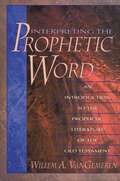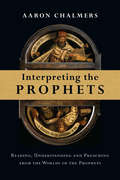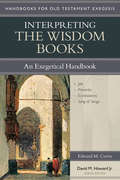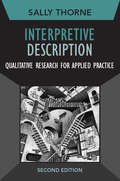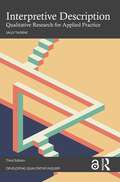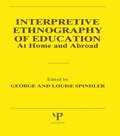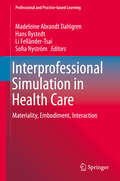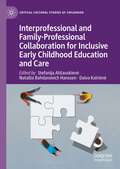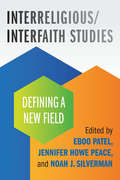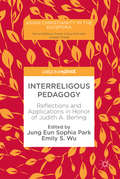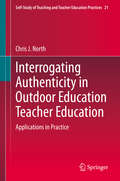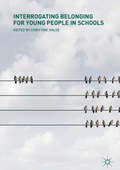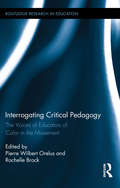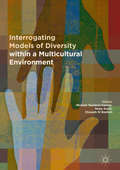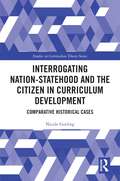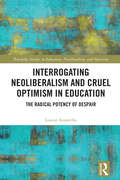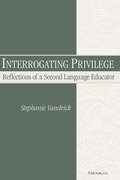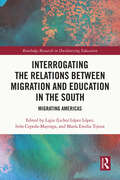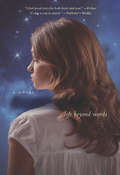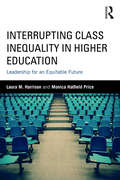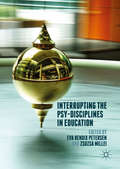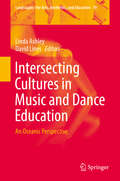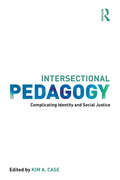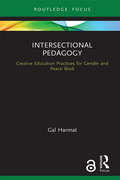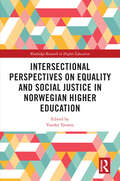- Table View
- List View
Interpreting the Prophetic Word: An Introduction to the Prophetic Literature of the Old Testament
by Willem A. VangemerenThe diversity of prophetic voices in the Bible provides a message that is rich and variegated. But the variety of the testimony can be lost by limiting one's interpretations or application of the prophetic word. Interpreting the Prophetic Word helps readers understand the harmony of the voices that reveal God's purposes in redemptive history. Dr. Willem VanGemeren explains clearly and fully the background of the prophetic tradition. He then interprets the message of the major and minor prophets, using historical context and literary form and structure as tools in his analysis. He concludes with an explanation of the relevance of the prophetic word today. Dr. VanGemeren's extensive research and scholarship is presented in a readable way to unlock the door of prophecy for readers. He helps them to interpret prophecy and invites them to listen to the prophets and to lives the prophetic word.
Interpreting the Prophets: Reading, Understanding and Preaching from the Worlds of the Prophets
by Aaron ChalmersThe prophetic books are some of the most captivating and fascinating texts of the Old Testament, but they are also some of the most misunderstood. Interpreting the Prophets equips the reader with the knowledge and skills they need to interpret the Prophets in a faithful and accurate fashion. Beginning with the nature of the prophetic role and prophetic books in Israel, Old Testament scholar Aaron Chalmers leads the reader through the various "worlds" of Israel's prophets—historical, social, theological and rhetorical— providing the basic contextual and background information needed both for sound and sensible exegesis, and for sensitive interpretation and application for today. He concludes with a helpful chapter giving guidelines for preaching from the Prophets—including advice on choosing the texts, making appropriate analogies, and the potential problems and common pitfalls to avoid.
Interpreting the Wisdom Books: An Exegetical Handbook (Handbooks for Old Testament Exegesis)
by Edward M. CurtisThe Wisdom Literature of the Bible (Job, Proverbs, Ecclesiastes, and Song of Songs) is filled with practical principles for everyday life. While some Christians are deterred by the pragmatic character of these matter-of-fact guidelines, they are as integral to God's purposes for His people as the explicitly theological material that dominates other parts of Scripture. The Wisdom books tie these two streams of God's revelation together in a way that enriches and strengthens the church.It is a thorough resource for pastors and teachers to help them navigate the sometimes bewildering waters of the Wisdom Literature.
Interpretive Description: Qualitative Research for Applied Practice (Developing Qualitative Inquiry)
by Sally ThorneThe first edition of Interpretive Description established itself as the key resource for novice and intermediate level researchers in applied settings for conducting a qualitative research project with practical outcomes. In the second edition, leading qualitative researcher Sally Thorne retains the clear, straightforward guidance for researchers and students in health, social service, mental health, and related fields. This new edition includes additional material on knowledge synthesis and integration, evidence-based practice, and data analysis. In addition, this book takes the reader through the qualitative research process, from research design through fieldwork, analysis, interpretation, and application of the results; provides numerous examples from a variety of applied fields to show research in action; uses an accessible style and affordable price to be the ideal book for teaching qualitative research in clinical and applied disciplines.
Interpretive Description: Qualitative Research for Applied Practice (Developing Qualitative Inquiry)
by Sally ThorneInterpretive Description: Qualitative Research for Applied Practice has established itself as the key resource for novice and intermediate level researchers in applied settings for conducting a qualitative research project with practical outcomes.This book takes the reader through the qualitative research process, from research design through fieldwork, analysis, interpretation, and application of the results; provides numerous examples from a variety of applied fields to show research in action; and uses an accessible style to be the ideal book for teaching qualitative research in clinical and applied disciplines. In this new, third edition, leading qualitative researcher Sally Thorne retains the clear, straightforward guidance for researchers and students in health, social service, mental health, and related fields. This new edition includes additional material on positionality, disciplinary blindspots, design logic, arts-based approaches, diversity, mixed methods, writers' block, and dealing with critique. It has been comprehensively updated with new references and case examples throughout.Interpretive Description is an ideal resource for instructors and advanced students interested in qualitative research across a range of disciplines.
Interpretive Ethnography of Education at Home and Abroad
by George Louise SpindlerThis ambitious and unique volume sets a standard of excellence for research in educational ethnography. The interpretive studies brought together in this volume are outstanding discipline-based analyses of education both in the United States and in complex societies abroad.
Interprofessional Simulation in Health Care: Materiality, Embodiment, Interaction (Professional and Practice-based Learning #26)
by Madeleine Abrandt Dahlgren Hans Rystedt Li Felländer-Tsai Sofia NyströmThis book describes and discusses a practice-oriented approach to understanding and researching interprofessional simulation-based education and simulation. It provides empirical findings from research on this topic and is informed by practice-oriented perspectives. It identifies critical features of the simulation practice and discusses how these can be used in reforming simulation pedagogy. The book is divided into three sections. Section 1 sets the scene for understanding the practices of interprofessional simulation-based education and simulation. It provides a theoretical and methodological framework for the conceptualisation of practices and for the empirical studies on which the book is based. Section 2 revisits the dimensions of the simulation process/exercise, i.e. the briefing, simulation, and debriefing, and provides empirical analyses of how the practice of simulation unfolds. Based on these analyses, section 3 identifies and discusses how pedagogies for simulation can be reformed to meet the demands of future healthcare and research.
Interprofessional and Family-Professional Collaboration for Inclusive Early Childhood Education and Care (Critical Cultural Studies of Childhood)
by Natallia Bahdanovich Hanssen Stefanija Ališauskienė Daiva KairienėThis edited volume covers issues related to educational research and practices for early childhood education and care (ECEC), highlighting interprofessional and family-professional collaboration within inclusive education in different cultural contexts. Contributors include authors from throughout Europe, including Lithuania, Norway, Iceland, Finland, Sweden, Spain, UK, and Ukraine. Chapters provide a forum for intentional dialogue about and shared understanding of successful and inspiring ECEC practices, the main barriers of interprofessional and family-professional collaboration, and opportunities for further improvement of inclusive ECEC practices.
Interreligious/Interfaith Studies: Defining a New Field
by Eboo Patel Jennifer Howe Peace Noah SilvermanA groundbreaking academic anthology that explores the emerging field of interreligious/interfaith studiesAs it is now backed by an impressive number of courses, academic programs and centers, faculty positions, journals and publications, funding, and professional partnerships, there is no longer a question as to whether the interreligious/interfaith field exists. But its meaning and import are still being debated. How is this field distinct from, yet similar to, other fields, such as religious or theological studies? What are its signature pedagogies and methodologies? What are its motivations and key questions? In other words, what is the shape of interfaith and interreligious studies, and what is its distinct contribution? These questions are the driving force behind this anthology.
Interreligous Pedagogy: Reflections and Applications in Honor of Judith A. Berling (Asian Christianity in the Diaspora)
by Jung Eun Park Emily S. WuThis volume is a collection of essays by former students of Judith Berling based on her revolutionary interreligious pedagogy. Her pedagogy can be summarized as a student centered, collaborative, and engaging teaching and learning process sparked by various ways of boundary-crossing. In this enterprise, each chapter explores the importance of understanding and negotiating “differences” through dialogue. The authors provide theoretical frameworks for engagements across conventional borders, and explore how the collaborative teaching model can be utilized in various teaching settings. As an example of her dialogical approach, Judith Berling herself provides a response to the chapters.
Interrogating Authenticity in Outdoor Education Teacher Education: Applications in Practice (Self-Study of Teaching and Teacher Education Practices #21)
by Chris J. NorthThis book addresses student passivity in teacher education. Using a developed metaphor, the author critically examines the use of authentic learning to design and implement learning experiences for preservice teachers, and reveals the opportunities and limitations of a focus on authenticity.This book prepares teachers for outdoor education using practice-based exemplars of applied teaching theories. Focusing on authentic pedagogies, it applies to all teacher educators who seek to engage in high-impact learning for their students, and is relevant for in-service educators, preservice teachers and researchers in the field of self-study.
Interrogating Belonging for Young People in Schools
by Christine HalseIn an era when many young people feel marginalized and excluded, this is the first comprehensive, critical account to shed new light on the trouble of ‘belonging’ and how young people in schools understand, enact and experience ‘belonging’ (and non-belonging). It traverses diverse dimensions of identity, including gender and sexuality; race, class, nation and citizenship; and place and space. Each section includes a provocative discussion by an eminent and international youth scholar of youth, and is essential reading for anyone involved with young people and schools. This book is a crucial resource and reference for sociology of education courses at all levels as well as courses in student inclusion, equity and student well-being.
Interrogating Critical Pedagogy: The Voices of Educators of Color in the Movement (Routledge Research in Education)
by Pierre Wilbert Orelus Rochelle BrockEducators, teacher practitioners, and social activists have successfully used critical pedagogy as a tool to help marginalized students develop awareness and seek alternative solutions to their poor educational and socioeconomic situations. However, this theory is often criticized as being mostly dominated by privileged white males, bringing issues of race and gender to the forefront. This volume provides insight on how critical pedagogy can be helpful to scholars and teachers alike in their analysis of racial, gender, linguistic and political problems. It features a wide range of respected scholars who examine the way and the degree to which critical pedagogy can be used to improve education for students of color, women and other marginalized groups.
Interrogating Models of Diversity within a Multicultural Environment
by Michael Tonderai Kariwo Neda Asadi Chouaib El BouhaliDiscussing common understanding of the concepts of multiculturalism, diversity, and inclusion, this volume critically examines the interpretation and praxis of diversity and inclusion in relation to marginalized populations—from women, sexual minorities, minority newcomers, and aboriginal communities. The contributors collected here present well-grounded epistemological, theoretical, and methodological bases from which to account (at least in part) for the processes and dynamics shaping the relationship between diversity and inclusion, on the one hand, and policy and practice on the other. Arising from research derived in part from community work with minorities in North America, particularly Canada, this volume examines common barriers to full minority integration, with important implications for inclusion efforts around the globe.
Interrogating Nation-Statehood and the Citizen in Curriculum Development: Comparative Historical Cases (Studies in Curriculum Theory Series)
by Nicole GotlingThis book dives into the histories of nation-state-building and curriculum formation to explore the ways that they intertwine, form and inform each other.This book follows the understanding that nation-states have – and still do – develop their educational institutions, curricula, and teaching materials with specific goals and with a specific idea of the ideal student and citizen they want to create in mind. In particular, it advocates that analyzing multiple, idiosyncratic cases can inform the connection between what we learn, how we learn it, and who we become as citizens and further, that this is related not to linear or global phenomena, but to particular nation-states, curricula, and time periods. This book focuses on the comparison between four cases during the time of the large, map-changing events and period of the Prussian Wars (1864–1871) to make the intertwined relationships between nation-states and their curricula, designed to create future loyal citizens, more apparent. It makes a point of reconstructing each of the nation-states' historical national-political and educational processes, and then the reconstructed trajectories are compared both in their own trajectories over time throughout the 19th century and up until World War II and in relation to other nation-states' trajectories over the same long timespan.Exploring a new pathway into research on the intersection of education, curriculum, and nationalism and providing a new, extensively researched and formed methodological framework, it will appeal to researchers, academics, and postgraduates with interests in comparative and international education, curriculum studies, the history of education, nationalism, state-building, and textbook analysis.
Interrogating Neoliberalism and Cruel Optimism in Education: The Radical Potency of Despair (Routledge Studies in Education, Neoliberalism, and Marxism)
by Louise AzzarelloThis book is a philosophical examination of the ways in which neoliberalism underpins and impedes public education. It proposes that education’s adoption of neoliberal logic generates a sense of despair amongst educators, who often enter the profession with the hope of building a better, more just world.Drawing on the author’s 27 years of experience as a secondary classroom teacher and engaging with a range of theoretical concepts, cultural objects, and scenes of violence from her time in the classroom, The Radical Potency of Despair renders visible the ongoing harms that neoliberal logic creates for education and educators. The author proposes a new “ruptured fantasy of education” and suggests that it is not hope that ignites educators who keep fighting for education, but rather despair. Despair is conceived of as a generative force, provoking educators to hold time and space open for pedagogical encounters that interrupt the ongoing instrumentalization of education. The author further conceptualizes a notion of thinking with images as a pedagogical interruptive force. Thinking with images, she argues, gives students time and space to attend to what they see, thus affording them the chance to think differently about the violence of modern society. Such pedagogical interruptions are presented as a refusal of the normative order of education, countering present infrastructures that aim to constrain and instrumentalize education.A compelling and original volume, it will appeal to scholars, researchers, and upper-level students with interests in neoliberalism and education, the philosophy of education, critical pedagogy, and educational policy and politics.
Interrogating Privilege: Reflections of a Second Language Educator
by Stephanie VandrickInterrogating Privilege is a welcome combination of personal essays and academic research, blending theory, analysis, and narrative to explore the function and consequences of privilege in second language education. While teachers’ focus on the learning process and class goals are quite important, there is not enough attention paid to the types of privilege—or lack thereof—that individuals bring to the classroom. Through chapters that can either stand alone or be read together, with topics such as gender, age, and colonialism (the author is the daughter of missionary parents) in second language teaching, this book seeks to address the experiences of teachers, scholars, and students as “whole persons” and to observe the workings of identity and privilege in the educational setting.
Interrogating the Relations between Migration and Education in the South: Migrating Americas (Routledge Research in Decolonizing Education)
by Ligia Licho López López Ivón Cepeda-Mayorga María Emilia TijouxAdopting a uniquely critical lens, this volume analyzes the relationship between forced migration, the migrations of people, and subsequent impacts on education. In doing so, it challenges Euro-modern and colonial notions of what it means to move across 'borders'. Using Abiayala and its diasporas as theory and context, this volume critiques dominant colonial attitudes and discourses towards migration and education and suggests alternatives for understanding how culturally grounded pedagogies and curricula can support migrating youth and society more broadly. Chapters use case studies and first-hand accounts such as testimonios from a variety of countries in the Global South, and discuss the lived experiences of Afro-Colombian, Haitian, and Indigenous youth, among others, to challenge the rigid disciplinary borders upheld by Euro-modern epistemologies. This text will benefit researchers, academics, and educators with an interest in international and comparative education, multicultural education, and Latin American and Caribbean studies more broadly. Those specifically interested in anticolonial education, diaspora studies, and educational policy and politics will also benefit from this book.
Interrupted: A Life Beyond Words
by Rachel CokerThe nightmares of caring for a terminally-ill mother have taken their toll on fourteen-year-old Allie Everly, and being orphaned then adopted and sent across the country during the Great Depression have nurtured the seeds of bitterness in her heart. After blaming her best friend, Sam, for her mother’s death, she is suddenly confronted by a new mother, a new family, and new circumstances. Time after time she rejects those who try to reach out to her, caught up in her own self-pity and longings. But when Sam appears four years later, Allie must confront not only who she has become, but a host of confusing emotions. After years of pushing people out, can Allie finally find forgiveness and comfort in God, and open her heart to the healing powers of love and family?
Interrupting Class Inequality in Higher Education: Leadership for an Equitable Future
by Laura M. Harrison Monica Hatfield PriceInterrupting Class Inequality in Higher Education explores why socioeconomic inequality persists in higher education despite widespread knowledge of the problem. Through a critical analysis of the current leadership practices and policy narratives that perpetuate socioeconomic inequality, this book outlines the trends that negatively impact low- and middle-income students and offers effective tools for creating a more equitable future for higher education. By taking a solution-focused approach, this book will help higher education students, leaders, and policy makers move from despair and inertia to hope and action.
Interrupting the Psy-Disciplines in Education
by Zsuzsa Millei Eva Bendix PetersenThis book offers critical explorations of how the psy-disciplines, Michel Foucault's collective term for psychiatry, psychology and psycho-analysis, play out in contemporary educational spaces. With a strong focus on Foucault's theories, it critically investigates how the psy-disciplines continue to influence education, both regulating and shaping behaviour and morality. The book provides insight into different educational contexts and concerns across a child's educational lifespan; early childhood education, inclusive education, special education, educational leadership, social media, university, and beyond to enable reflection and critique of the implications of psy-based knowledge and practice. With chapters by a mixture of established and emerging international scholars in the field this is an interdisciplinary and authoritative study into the role of the psy-disciplines in the education system. Providing vivid illustrations from throughout the educational lifespan the book serves as an invaluable tool for reflection and critique of the implications of psy-based practice, and will be of particular interest to academics and scholars in the field of education policy and psychology.
Intersecting Cultures in Music and Dance Education
by David Lines Linda AshleyThis volume looks forward and re-examines present day education and pedagogical practices in music and dance in the diverse cultural environments found in Oceania. The book also identifies a key issue of how teachers face the prospect of taking a reflexive view of their own cultural legacy in music and dance education as they work from and alongside different cultural worldviews. This key issue, amongst other debates that arise, positions Intersecting Cultures as an innovative text that fills a gap in the current market with highly appropriate and fresh ideas from primary sources. The book offers commentaries that underpin and inform current pedagogy and bigger picture policy for the performing arts in education in Oceania, and in parallel ways in other countries.
Intersectional Pedagogy: Complicating Identity and Social Justice
by Kim A. CaseIntersectional Pedagogy explores best practices for effective teaching and learning about intersections of identity as informed by intersectional theory. Formatted in three easy-to-follow sections, this collection explores the pedagogy of intersectionality to address lived experiences that result from privileged and oppressed identities. After an initial overview of intersectional foundations and theory, the collection offers classroom strategies and approaches for teaching and learning about intersectionality and social justice. With contributions from scholars in education, psychology, sociology and women’s studies, Intersectional Pedagogy include a range of disciplinary perspectives and evidence-based pedagogy.
Intersectional Pedagogy: Creative Education Practices for Gender and Peace Work (Routledge Research in Educational Equality and Diversity)
by Gal HarmatIntersectional Pedagogy: Creative Education Practices for Gender and Peace Work teaches educators to use innovative learning methods to encourage students to rethink culture, gender, race, sexual orientation, and social class with a deep awareness of accessible language as a means of communication across disagreements. With a focus on emancipatory critical pedagogy, as well as tools to promote sustainable peace and human rights advocacy, the book's main objective is to examine and present methods that can help students address rapidly changing social situations. Recent developments under discussion include the #MeToo and #WhyIDidntReport campaigns to counter sexual violence, campaigns to support refugees and migrants, and other human rights issues. The book examines how theory can be translated into practice and how various dilemmas pertaining to young people navigating a changing world can be successfully addressed in the classroom. This book is an ideal reading for researchers and postgraduate students in education. It is written for practitioners in peace education and for those within traditional and alternative academia who wish to promote intersectional awareness in their teaching.
Intersectional Perspectives on Equality and Social Justice in Norwegian Higher Education (Routledge Research in Higher Education)
by Vander TavaresHighlighting how systemic inequities in Norwegian higher education are perpetuated through colonial legacies, monocultures of knowledge, and a lack of critical engagement, this book offers an intersectional analysis that identifies issues and complexities in the domains of pedagogy, epistemology, research, curriculum, and support services.Foregrounding the voices of researchers, teacher educators, and student teachers through a variety of methodological approaches, the volume examines and critiques interconnected barriers rooted in experiences and ideologies of class, gender, sexual orientation, race, ethnicity, body, language, literacy, and religion that marginalize students and scholars, particularly those with multiple minority identities. Chapters identify persistent gaps in policy and practice in the experiences of students and scholars, including those from the Global South, despite growing equity, diversity, and inclusion mandates and discourses promoted by Norwegian higher education. To address such challenges, this volume advocates for decolonization, pluriversality, and systemic changes in higher education and academic practices through intersectionality to create a more inclusive and equitable higher education landscape.Advocating for the need to ethically humanize, diversify and decolonize Norwegian higher education, this book will be of interest to researchers, scholars and postgraduate students in the fields of higher education, multicultural education, and sociology of education. Policymakers and administrators may also benefit from the volume.
